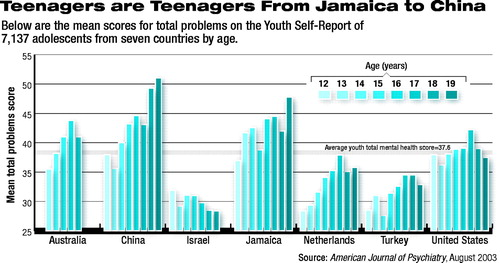For Teens, Mental Illness Knows No Borders
 How do the mental health problems experienced by teens in one country compare with those experienced by teens in another country?
How do the mental health problems experienced by teens in one country compare with those experienced by teens in another country?
They tend to be quite similar, a new seven-country study suggests, and girls tend to have more mental health issues than boys do.
A difference is that girls are apt to internalize their difficulties, boys to externalize theirs.
The study was headed by Frank Verhulst, M.D., of Erasmus University in Rotterdam, the Netherlands, and is reported in the August American Journal of Psychiatry.
The study focused on some 7,000 randomly selected adolescents aged 11 to 18 in Australia, China, Israel, Jamaica, the Netherlands, Turkey, and the United States.
Verhulst and his coworkers gave a questionnaire called the Youth Self-Report to the subjects. The questionnaire is designed to be completed by youth aged 11 to 18 and contains 101 problem items. The problem items are scored as follows: 0=not true; 1=somewhat or sometimes true; and 2=very true or often true on the basis of the preceding six months.
Questionnaire Identifies Similarities
The questionnaire can be scored for particular kinds of problems such as anxiety, depression, somatic complaints, and aggressive behavior. The questionnaire has been documented as reliable and valid in the United States and other countries. For the purpose of this study, it was given in English to youth in Australia, Jamaica, and the United States; and in Chinese, Hebrew, Dutch, and Turkish to youth in China, Israel, the Netherlands, and Turkey, respectively.
After the subjects completed the questionnaire, the researchers computed the total problem score for each subject; an average total problem score for all subjects in each country; and an average total problem score for all 7,000 subjects. Then the average total problem score for youths in each country was compared with the average total problem score for youths in all seven countries.
The average total problem score was found to be 37.6, and the average total problem score for youth in each of the seven countries was found to deviate to a statistically significant degree, but not all that dramatically, from that 37.6. Specifically, the largest deviation above the average, 6.6, was for Chinese youth, whereas the lowest deviation from the average, -7.2, was for Israeli youth. Youth from the other five countries had an average total score that deviated within five points from 37.6.
The total problem scores for subjects in each of the seven countries were also compared by gender. With cross-culture consistency, girls were found to have significantly higher total scores than boys and to score higher on internalizing problems. However, boys scored higher on externalizing problems.
These results suggest that the mental health challenges of teens throughout the world are similar in many ways. Or as Verhulst and his team wrote in their study report: “Adolescents from different countries responded in fairly similar ways to the problem items of the Youth Self-Report, despite large variations in language, customs, religion, socioeconomic circumstances, and health care systems.”
Some Differences Revealed
In contrast, the study did reveal some interesting differences among youth in the seven countries. For instance, youth in China, Australia, and the Netherlands showed the steepest increases with age on scores for internalizing problems, externalizing problems, attention problems, and delinquent behavior, whereas young people in Israel showed the smallest increases with age on scores for such problems.
Regarding somatic complaint scores, teens in Australia, China, and Jamaica showed an increase with age, whereas youth in the Netherlands and Turkey did not, and teens in Israel and the United States actually showed a decline. On the social-problem front, boys scored higher than girls in Australia, Israel, the Netherlands, and the United States, whereas girls scored higher in China, Jamaica, and Turkey.
The study was funded by the National Institute of Mental Health, the Sophia Foundation for Medical Research, the Western Australian Health Promotion Foundation, and the Australian Rotary Health Research Fund.
The study, “Comparisons of Problems Reported by Youths From Seven Countries,” is posted on the Web at http://ajp.psychiatryonline.org/cgi/content/full/160/8/1479?. ▪
Am J Psychiatry 2003 160 1479



